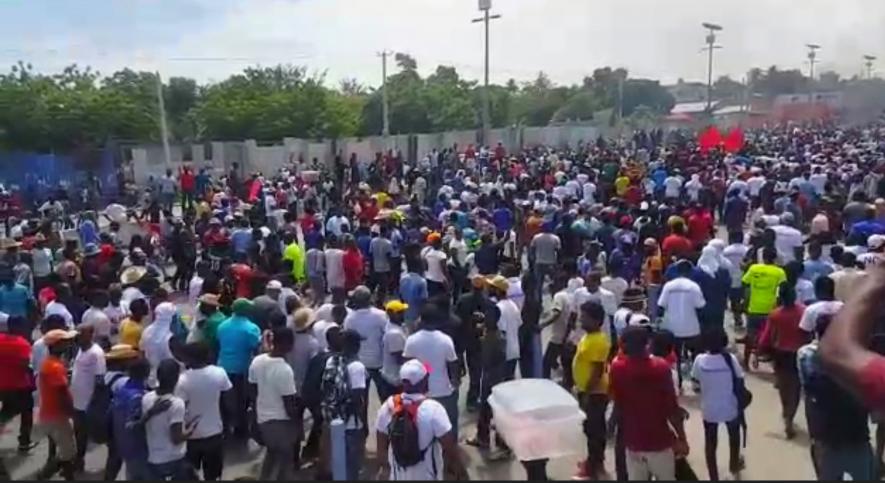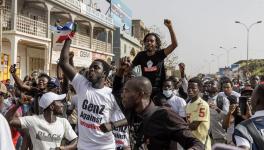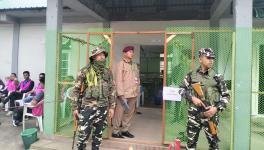Fresh Protest in Haiti Demanding President Moïse’s Resignation

On June 9, tens of thousands of Haitians took to the streets in the capital Port-au-Prince and other main provincial cities demanding the immediate resignation of president Jovenel Moïse. They also demanded the arrest and judicial proceeding of all those involved in the embezzlement of 3.8 billion dollars of Venezuela’s Petrocaribe funds given to the country to help finance various social schemes. The mobilization was called for by a number of social, political, human rights and feminist organizations and trade unions.
The organizations through a joint communiqué explained the reason behind the mobilization. “We mobilize to find solutions to the problems of poverty, hunger, housing, health and all the other calamities that the Haitian Tèt Kale Party (PHTK) aggravated significantly throughout the country. We mobilize to create the conditions to facilitate investments in the country as well as real jobs to allow a decent life for all. We mobilize to find solutions to the problems of insecurity, to the existence of armed groups and gangs managed by the PHTK and its allies that swarm throughout the country to impose terror and prevent people from living. We mobilize to carry out the Petrocaribe process under appropriate conditions,” read the communiqué.
Several important roads were blocked with tires across Haiti completely paralyzing the traffic and hindering everyday activities. In Port-au-Prince, a massive mobilization was carried out from the intersection of several roads in Delmas and the Pan-American Avenue to the Campo de Martes, the main square of the city, where the official seat of the presidency is located.
The protest started off calm, but in the afternoon, the protesters heading towards the Campo de Martes were violently repressed by the officials of the National Police of Haiti (PNH). The police threw tear gas at the demonstrators affecting dozens of people. In response, protesters began throwing stones at the police as well as at government buildings. Several vehicles and two government buildings were burned. Police fired live bullets at the protesters which killed two and severely injured several. In the course of the mobilizations in Port-au-Prince 12 were arrested.
Similar demonstrations were witnessed in the cities of Saint Marc, Gonaïves, Jérémie, Miragoâne, Les Cayes, Belladère and Cap-Haïtien. In Cap-Haïtie as well, two other protesters died as a result of police repression and several were injured.
The opposition and a grassroots anti-corruption group Petrochallengers have called for a two-day general strike on June 10 and 11 in order to continue pressurizing the president until he steps down from power.
The fresh anti-government protest broke out after Haiti’s Superior Court of Auditors and Administrative Disputes (CSCCA) issued its second investigation report on the case and revealed that Agritrans S.A., a company owned by president Moïse in 2014, was involved in the financial fraud.
The report submitted by the CSCCA to the Haitian Senate on May 31 revealed that the amount of around 1 million USD for the rehabilitation of Borgne-Petit Bourg de Borgne road section in northern Haiti was paid twice. In 2014, the State signed two identical contracts with two separate companies, Agritrans and Betexs. The two companies share the same tax identification number, government patent and technical staff in their portfolio with the only difference being the names of their heads. Agritrans listed Jovenel Moïse as its head and Betexs listed someone else.
Petrocaribe is an energy integration platform initiated by Commander Hugo Chávez in 2005 and sustained until today by the Bolivarian Revolution of Venezuela. It offers oil to 19 Caribbean nations at low cost, with a 25-year financing term, a negligible interest of 1%, and the possibility of paying back for crude oil in the form of goods and services. In all these small countries, dependent on oil imports, Petrocaribe has financed more than 109 programs and social projects.
Earlier this year, in February, thousands mobilized across the country for 4 consecutive days to protest against widespread inflation and to demand the resignation of the president. The series of protests was also a product of the revelations made in the first report by the CSCCA. The report revealed that over 15 ministers and senior officials of the former president Michel Martelly’s administration and a company then run by the current president Jovenel Moïse benefitted from the funds directed to public programs and that none of them have been prosecuted. Last year, on October 17 and November 18, massive anti-corruption protests demanding president’s resignation were held across the country.
Get the latest reports & analysis with people's perspective on Protests, movements & deep analytical videos, discussions of the current affairs in your Telegram app. Subscribe to NewsClick's Telegram channel & get Real-Time updates on stories, as they get published on our website.
























